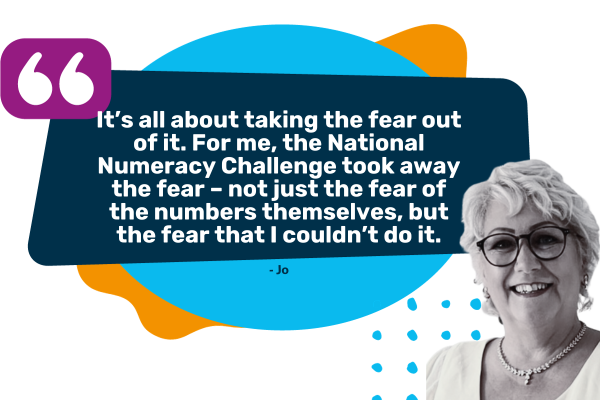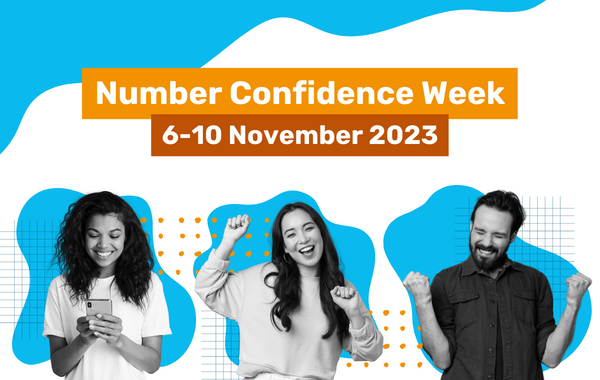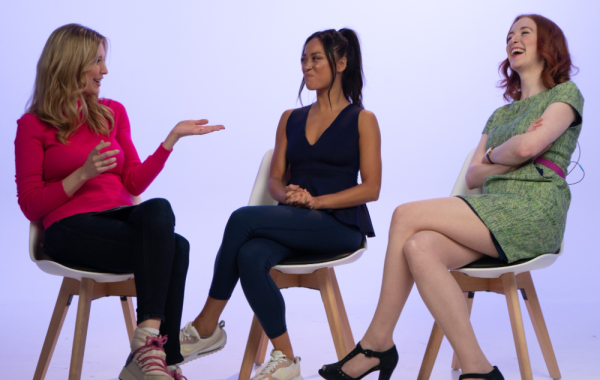I found maths awful when I was at school, absolutely awful. Even at primary school I used to struggle. Our teacher would give us a grid with two to 12 down the side and two to 12 across the top and he would time us on our times tables. I could do the twos but I couldn’t do the fours. I soon worked out that I could get the fours by doubling the twos and the eights by doubling the fours. I didn’t learn them, I just blagged my way through them.
I went to a grammar school at 11 and maths didn’t get any better for me. Each year I went down a stream in maths, which was disheartening and the work didn’t get any easier.
Avoiding maths in adulthood
My school experiences with maths put me off it in adulthood – if I couldn’t use a calculator for something, I wouldn’t do it. I used to work for a flight case company and design the flight cases, which was all about measuring. I was in charge of production and ordering. It was relevant maths and if I had a calculator, which I did, I could do anything at all.
But I used to play in a ladies’ darts team and each of us would take a turn at scoring and I used to dread it, I just couldn’t do it. It was on a Friday night and I would always play first because I was one of the better players, but then I would get a bit tipsy so I had an excuse not to have to score. To say that I would try and avoid maths – absolutely I would.
It was embarrassing, everybody else could do it. They’d say: “You need to get up and do it Jo, it will help your maths,” but it really didn’t, because it was something that was done in front of people. Everybody was watching, so if I got it wrong, everybody knew I’d got it wrong.
How the National Numeracy Challenge has helped me
I think I learnt about the National Numeracy Challenge through social media. I thought: “This looks interesting.” I clicked on it and did the little quiz and I was absolutely hopeless at it.
My score to start with was awful and made me think: “Why did I bother?” But when I did it the next time and I saw a better score, and then a better score and then a better score, I thought: “Do you know what? I can do this.”
You can use a calculator, but to start with I tried to do it mentally, so obviously I was getting quite low scores. But even without the use of a calculator, I still got better because the other thing is that if you get the answer wrong, you can find out what the right answer is, but you don’t just find out what the answer is, you find out how to get to the answer.
And that is the biggest thing I found with National Numeracy, it’s that you get that explanation of how it works.
I love it. I like the examples you get – it’s all relevant stuff, it’s everyday maths that everybody needs to know.
I read through the rest of the website about how National Numeracy can help and it asked: “What are your goals?” I put: “To be able to use maths quicker in everyday environments.” I just signed up from there and every so often I go in and do it all over again.
I have got progressively better each time, so there is something in there that works with my head to actually get it into my head. I know I will never be great with numbers, but I am so much better now because of the questions that I’ve done through National Numeracy.
When we just used cash in shops, I would go to pay for things and I wouldn’t have enough money because I wasn’t able to add it up as I went round, but now I feel a lot more confident about adding things up. You need to be able to do things in your head sometimes and for me, those times are considerably less stressful now because of what I’ve done with National Numeracy.
In my family it was a running joke that I’ve only got 10 fingers, so I couldn’t count to more than 10. But it is nice now to be able to say to my sister: “I don’t need my fingers at all now, so there!” To be able to reverse that joke was a huge thing for me. My sister said: “Wow, you’re really good at maths now!” and she really meant it.
I’ve told loads of people to do the National Numeracy Challenge. Everybody can do with a bit of practice every so often. I can get all the questions right when I use a calculator, but my goal is to be able to get every one right doing it in my head and once I’ve done that I will be really happy.
Why you should try the National Numeracy Challenge
To anyone thinking of trying the National Numeracy Challenge I would say: “Absolutely go on and do it.” Grab yourself a pen, a piece of paper and a calculator – you will surprise yourself. Just do it and then in a few weeks’ time, do it again and then in a few weeks’ time do it again and see how you improve each time.
I would also tell people to take the time to look at the answers you got wrong and, most importantly, look at the explanation of how to get the correct answer because it’s that that will give you the tools you need to succeed. If you don’t look at that bit, you’re still just getting it wrong and you’re not learning anything.
The National Numeracy Challenge has made me much more confident because it has reinforced in my head that you can do things, you don’t have to accept that you can’t do it, which is exactly what I’d done.
I’m not avoiding numbers anymore like I used to.
Boosting confidence with numbers
I’ve done various training courses with companies, all of which had an element of maths in, but there was always that thing of: They’re going to ask me a question based on, “What happens if you add this to this,” or “How much of this do you need to add to this to get this?” and I’d think: “I’m not going to be able to answer it.” But if I was in those situations now I feel that I would be able to. I think now there are more doors open to me than there were before.
I would be much happier now to look for a job that included more numeracy in it than I had done previously.
Overall it has made me more confident in my abilities to deal with numbers on a daily basis.
It’s helped me in daily life with shopping and knowing whether something is a bargain or not. I can do all that now and I can do it while I’m looking at it which is a huge thing because I never would have been able to before the Challenge.
The National Numeracy Challenge has given me little tips on how to do those types of calculations, so you can then take that and put it into everyday life. In this day and age with the cost of everything going up, it’s actually a very valuable skill to have. It is absolutely imperative that people really start to look at how much they have and where they can make savings.
I’m a lot more confident with numbers and rather than just whack it in a spreadsheet, a lot of it I can just do on paper now, which is a huge step forward for me. Even just adding up a row of numbers on a piece of paper comes so much more easily, I rarely use my fingers anymore. It’s only when people that know I used to do that see and they realise: ‘She’s got better at this, what has she done?!’ and then I tell them what I’ve done!
Removing the fear of numbers
Before doing the National Numeracy Challenge, the word I would have used to describe how I felt about maths would be ‘Embarrassed,’ but now I would use ‘Confident.’
Pre-National Numeracy Challenge I never would have imagined that one day I might want to go back and get a maths qualification, but since then I have actually seriously thought about doing a Maths GCSE!
It’s all about taking the fear out of it. For me, the National Numeracy Challenge took away the fear – not just the fear of the numbers themselves, but the fear that I couldn’t do it.
If my story can make one person go onto the website and have a go and learn how to do something, then that will make me extremely happy!







